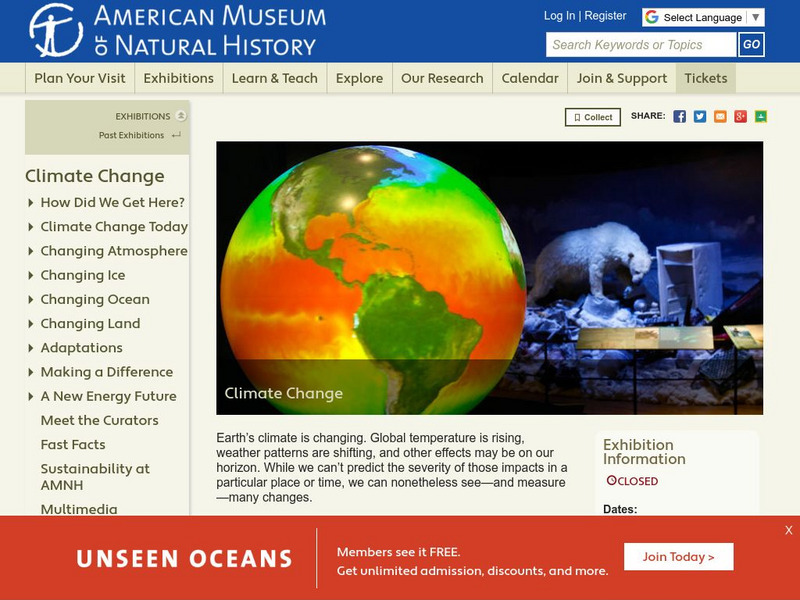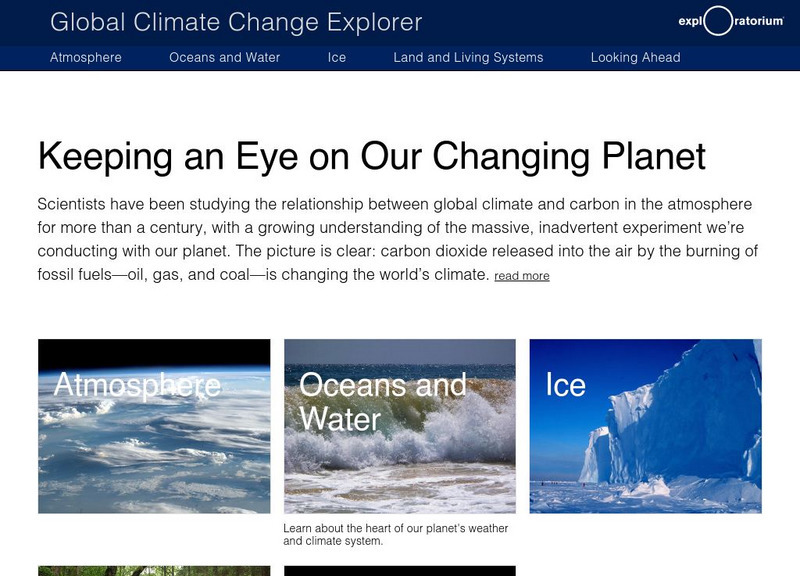Hi, what do you want to do?
American Museum of Natural History
American Museum of Natural History: Climate Change
A complete guide to the planet's climate change, including evidence, causes, effects, and conservation efforts.
Other
Inside the Human Body: The Respiratory System
This site has respiratory system activities and learning games for students at all grade levels.
TED Talks
Ted: Ted Ed: James Balog: Time Lapse Proof of Extreme Ice Loss
In this video, James Balog describes how evidence for glaciers receding due to climate change can be seen through time-lapse photography. [19:20] Includes a brief quiz and a list of additional resources to explore.
Annenberg Foundation
Annenberg Learner: The Habitable Planet: Energy Lab
Try and meet global energy demands by using alternative energy sources while keeping the carbon levels in the atmosphere down to acceptable levels. Simulator includes a data table available for download for student records.
Other
College of Du Page: Energy in an Ecosystem
Ecosystems contain two kinds of commodities: matter (nutrients) and energy. Nutrients cycle through the ecosystem, available for repeated use by organisms. These cycles of use and reuse are called biogeochemical cycles. Energy instead is...
University Corporation for Atmospheric Research
Ucar: Name That Air Pollutant
Students create graphic organizers describing the four major air pollutants regulated by the U.S. Clean Air Act (ground-level ozone, particle pollution, carbon monoxide, and sulfur dioxide) and then identify the pollutants with a...
Exploratorium
Exploratorium: Global Climate Change: Research Explorer
Explore scientific data relating to the atmosphere, oceans, areas covered by ice, and living organisms in all these domains. Interpret past and present climate data to predict future climate change and its possible effects.
US Environmental Protection Agency
Epa: Air Trends
Each year EPA tracks the levels of pollutants in the air and how much of each pollutant (or the pollutants that form them) is emitted from various pollution sources. The Agency looks at these numbers year after year to see how the...
Other
Florida Department of Environmental Protection: Climate Change and Coral Reefs
Find out about the devastating effects climate change is having on Florida's coral reef ecosystems.
Texas Instruments
Texas Instruments: P H
Students use a pH sensor to measure the pH level of water in a stream or lake. They examine how air pollutants like sulphur dioxide, nitrogen oxides, and carbon dioxide cause acid rain, which affects the pH of water bodies and aquatic...
Texas Instruments
Texas Instruments: Greenhouse Gas Emissions
In this activity, students analyze statistical data using the calculator and the TI InterActive! software. They use linear regression to study the increase in levels of carbon dioxide emission over the years.
NASA
Nasa Earth Observatory: Should We Talk About the Weather?
Discover how scientists use the BOREAS to gather data such as heat, carbon dioxide, water vapor, and more to see what role these levels have on climate changes.













